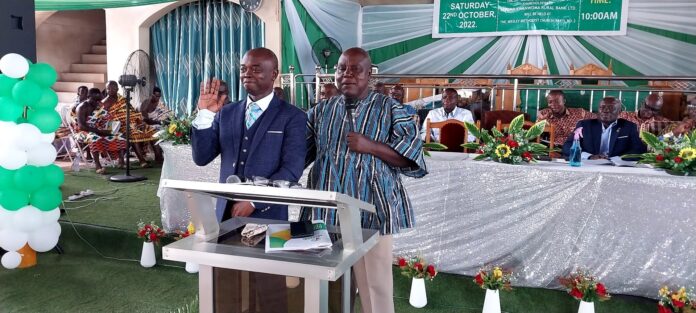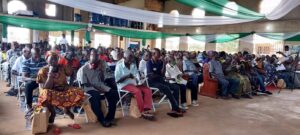
- pays GH¢ 0.080p as dividend per share
Atwima Kwanwoma Rural Bank Limited at Pakyi No2 in the Amansie Central district of Ashanti Region has recorded yet another remarkable operational performance in the 2021 year under review.
Profit & Dividend
The bank’s Board of Directors has proposed a dividend payment of GH¢0.080 per share, representing 16% of return on shareholders’ investment for the year 2021.
In all, 15,310,933 ordinary shares qualified for the dividend as at the closure of register on September 30, 2021; and this amounts to GH¢1,224,875. This became possible after the Bank of Ghana approved a proposal put in by the Board of Directors.
Effects of the COVID-19 pandemic on banks in general made the Bank of Ghana direct all Banks and Deposit Taking Institutions not to declare Dividend in two financial years: 2019 and 2020.
The central bank further directed that any bank or institution that wants to pay dividend after the two-year period must show evidence of readiness and technical justification for approval, which Atwima Kwanwoma Rural Bank easily ‘passed the test’ to pay 16% return on shareholders’ investment for the year under review.
The bank recorded a pre-tax profit of approximately GH¢7million in the reviewed year as against a little over GH¢ 5.9million in 2020, representing growth of 19.59%. Consequently, profit after tax increased from GH¢3,841,061in 2020 to GH¢4,919,808 in 2021 – representing an increase of 28.08%.
The Vice Chairman of the Board of Directors, Amoah Afrifa – who delivered the Chairman’s address, said these and more at the bank’s 39th Annual General Meeting of shareholders held last Saturday at Pakyi No 2 near Kumasi in Ashanti Region.

Operational Environment
According to him, developments in the global economy affected Ghana’s economy in diverse ways. The Gross Domestic Product [GDP] growth rate was 5.4% in 2021 as against 0.5% in 2020 as a result of growth in real-estate, transport, cocoa, import trade and other sectors of the economy. Inflation closed the year at 12.6% in 2021 from 10.4% in 2020, mainly due to sustained increases in food prices.
Interest rates on money market instruments, especially the Treasury bill rates, declined; and the weighted average interbank rate fell to 12.7% from 13.6% in 2020. The monetary policy rate increased to 14.5% in 2021 from 13.5%. The cedi depreciated against major currencies, notably the British pounds and US dollars, by 4.1% in 2021 as against 3.1% in 2020. The cedi however appreciated against the euro by 3.5% in 2021 as against a depreciation of 12.1% in 2020.
The bank’s performance in the banking sector remained strong at the end of 2021, with stout growth in total assets, deposits, investments and loans & advances despite the economic challenges, both internal and external. Total Assets increased by 20.4% to GH¢179.8billion as against 15.8% in 2020, which resulted in strong growth of investment in government securities. Total Deposits recorded moderate year-on-year growth, reflecting good liquidity flows. Gross Loans and Advances grew by 12.6% to GH¢53.8billion as at 2021.
Operational Performance
In spite of the above-mentioned macroeconomic and other external challenges, the bank remained strong and resolute in the market to achieve good results, as shown in the table below.
| Indicators | 2021 | 2020 | % Change |
| Deposits | 245,714,209 | 205,389,993 | 19.63 |
| Investments | 204,109,040 | 172,912,849 | 18.04 |
| Loans /Advances | 44,645,307 | 39,109,169 | 14.15 |
| Total Assets | 300,145,830 | 252,779,295 | 18.74 |
| Stated Capital | 3,414,415 | 3,353,995 | 1.80 |
| Shareholders’ Funds | 42,265,373 | 37,285,145 | 13.36 |
| Gross Income | 49,855,101 | 36,368,477 | 37.08 |
| Profit Before Tax | 7,078,566 | 5,918,843 | 19.59 |
Corporate Social Responsibility
In the year under review, the bank spent a total amount of GH¢117,243.00 on Corporate Social Responsibility activities for the stakeholders within its catchment areas; with special focus on Health, Education, Security, Agriculture and other social needs
Appointment of New Chief Executive Officer
The Board of Directors appointed a new Chief Executive Officer of the bank from 1st January, 2022. This was precipitated by Dr. Stephen Sarfo Kantanka’s end of term in office as Chief Executive Officer of the bank on 31st December 2021, due to compulsory retirement age.
The Board conducted an interview through a Search Team to appoint Samuel Bonsu Sekyere as next Chief Executive Officer for the bank. In compliance with section 60 (4) of the Banks and Specialized Deposit-Taking Institutions Act 2016, (Act 930), the Bank of Ghana has approved his appointment as Chief Executive Officer of the bank from March, 2022.
“Samuel Bonsu Sekyere has worked with the bank for the past 23 years and has an impeccable record, and his experience and knowledge cannot be questioned,” noted the chairman’s report.
Future Outlook
The newly-appointed CEO of the bank, Samuel Bonsu Sekyere, in an interview with Business & Financial Times said management will continue to seek ways of strengthening and developing the banks’ operations to maintain the confidence that customers and shareholders have in the bank.
The bank’s business model, according to the CEO, is still tailored for the Micro-, Small- and Medium Enterprises; and it will push to maintain its enviable position in the industry as the biggest rural bank in Ghana as it continues to develop innovative products and trusted relationships with clients.
Regulatory Commendation
The Ashanti Regional Manager of ARB Apex Bank PLC, Kofi Owusu – who delivered an address on behalf of Managing Director Alex Kwasi Awuah, commended the Board and management of Atwima Kwanwoma Rural Bank for a remarkable operational performance over the years, carving an industry niche for the entire rural banking industry.
He urged shareholders to support the Board in their quest to continue running the bank profitably to create value for their investment.
He further commended the bank for its marginal reduction of 3.85% for investments in Property, Plants and Equipment (PPEs) for the period, while encouraging sister Rural and Community Banks (RCBs) to emulate this worthy example so that they can invest in more interest-bearing ventures to make them more profitable.









